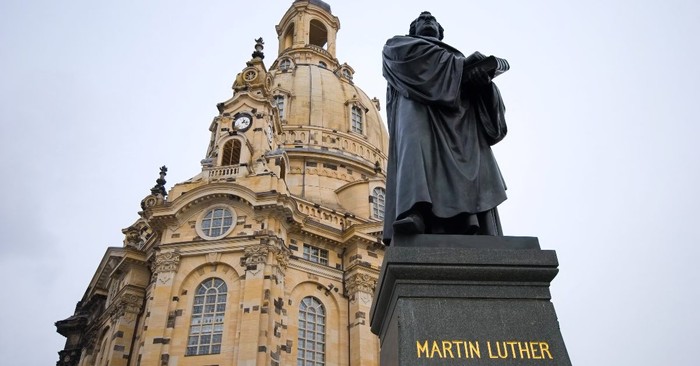
Luther spoke against... misconceptions of the gospel message. One might argue that we are in a similar boat today, with watered-down messages from the pulpit, Bible literacy, and general misrepresentation of the Christian faith.
Did you know that Halloween isn't the only thing celebrated on October 31st? Yes, October 31st is also Reformation Day! A day commemorating the start of the Protestant Reformation thanks to Martin Luther's single act of nailing his 95 Theses to the church's door on October 31st, 1517.
While many put the finishing touches on their costumes, prepping for a night of non-stop candy-munching and preparing for Halloween celebrations, Reformation Day is often overlooked on the calendar. But, as believers, this day marks one of the "greatest moves of God's Spirit since the days of the Apostles," as Ligonier ministries point out. So, what exactly are we called to remember? Is this holiday still significant for today's Christians?
Let's take a deeper look at this holiday and its importance for believers centuries ago and today:
The History of Reformation Day
On October 31st, 1517, a German Monk, Martin Luther, was beyond frustrated with the current situation of the Roman Catholic Church. For many years, Luther wrestled with the abundance of spending of church leaders and their ongoing abuse of power. Luther was also profoundly disturbed by selling indulgences, a blessing you could buy from the church for past, present, and future sins.
Luther was justified in his anger at the church for taking advantage of the congregation, convincing them that they could buy their way into heaven. And it's not a coincidence that Luther chose October 31st to get the church's attention. November 1st was already a holiday, All Saints Day.
On this particular November 1st, Wittenberg, Germany (Luther's hometown), was hosting an extensive exhibit of recently acquired relics, which people from all over would visit. While they were visiting the exhibition, they would also take the opportunity to pay large sums for these indulgences in hopes of securing their way into heaven. The thought of this happening was more than Luther could bear.
Luther wrote out 95 Theses (also known as Disputation of Martin Luther on the Power and Efficacy of Indulgences) meant to ignite a debate among church leaders and push congregants to examine church practices against Scripture. After nailing these theses to the church door, it was evident that the church needed more than a revitalization; it required a reformation! Though the church's actions grieved Luther, his plan was not to confront but to encourage the leaders to examine their hearts and motives.
Who was Martin Luther?
Luther was extremely well-studied in the Scriptures and began to oppose the Pope's quick selling of indulgences to "secure" salvation. Luther continued to engage in rigorous Bible study, which led him to take offense to the church's prioritizing traditions over preaching the Gospel. Besides being one of God's most excellent tools to expose sin and remind people of the Gospel, Luther was a law student who turned into an Augustine Monk.
However, it was the misrepresentation of justification that outraged Luther the most. Even though Scripture clearly states that it's not of human merit, we are justified only through the atoning work of Christ on the cross; popes, bishops, and priests of Luther's time preached that personal merit and financial contributions secured one's salvation.
Why was Luther so Upset with the Church?
Luther penned his 95 Theses (or issues) with the Roman Catholic Church as a result of not just being annoyed at their actions but distraught. One of Luther's theses states, "The Church's true treasure is the gospel of Jesus Christ." Luther was disgusted with how the Catholic Church twisted the gospel message, removing justification through Christ alone and replacing it with a works-based method for "securing" salvation.
The church had moved so far from the truth of the gospel message; church leaders and pastors were blinded by their greed and selfish desires. The Catholic Church spread a works-based salvation model, conveying that you must earn your way to Christ. And, if you couldn't achieve this by good behavior, you could always pay into heaven.
In another one of Luther's theses ( 86), he asks, "Why does the pope, whose wealth today is greater than the wealth of the richest Crassus, build the basilica of St. Peter with the money of poor believers rather than with his own money?" Luther desired to bring the hypocrisy in church leadership to the forefront, exposing the false message that one could buy or earn salvation. The church didn't control who accepted Christ; they didn't have the authority to save, yet, they had convinced people the only way to secure eternal salvation was through the church.
The Protestant Reformation Takes Off
It didn't take long for Luther's 95 Theses to be translated from Latin to German and circulated throughout Germany within weeks. The printing press was a recent invention that aided in the rapid spreading of Luther's ideas. It took only two months from his posting the theses on the church door to reach the hands of commoners all over the European continent.
Within two years, Luther's writings had reached England and France, driving many to visit Germany in hopes of hearing Luther preach. Luther went on to write a commentary on Galatians and work on Psalms.
While Reformation Day is essential and significant to both Luthern and Calvinist churches, the Protestant church continues to celebrate the holiday.
The Lasting Effects of the Reformation
Before Luther's 95 Theses, Bibles were scarce and limited to Latin translations. Luther's work to share the truth of the Gospel with all people was encouraged by working to make the Bible more accessible. The Roman Catholic church believed that only church leadership should have the opportunity to read and study the Scriptures, discouraging people from reading the Bible independently.
However, with Luther's help, the Bible was translated into German, putting the Scriptures in the hands of believers for the first time. Today, the Bible is translated into over 704 languages! We can credit Luther's reformation of the traditional Catholic Mass from Latin to a "common tongue" so that everyone, not just the clergy, could understand the preachings. Luther desired that everyone have access to the Scriptures and preached reverently that the Gospel is for all people. As one writer wrote for Liogner ministries, "Luther recaptured the biblical view of the priesthood of all believers, showing all people that their work had purpose and dignity because in it they can serve their Creator."
How Should We Celebrate the Reformation Today?
Unlike many other cultural celebrations, there isn't a clear method for celebrating Reformation Day. I think you would be hard-pressed to find "Reformation Party Ideas" on Pinterest, and I doubt your local dollar store would carry Luther paraphernalia. However, that doesn't mean this isn't a holiday worth celebrating.
Christians celebrate a few different holidays; some directly celebrate the gift of salvation, while others reflect on times of remembrance. The Reformation should be remembered and honored like any significant historical event, mainly so we can ensure history won't repeat itself. I think about the principles Luther spoke against and his passion for eradicating all misconceptions of the gospel message. One might argue that we are in a similar boat today, with watered-down messages from the pulpit, Bible literacy, and general misrepresentation of the Christian faith.
This November 1st, I encourage you to offer a prayer of gratitude. Thank the Lord for raising Luther to speak the truth and boldly proclaim the name of Christ. Perhaps we also pray that we, like Luther, would protect the Gospel message for generations.
Photo Credit: ©iStock/Getty Images Plus/SebastianHamm

She lives in Upstate South Carolina with her husband and three young girls, where she serves as director of women's ministries at her church. Her passion is teaching the Bible to women, equipping them to live with an eternal perspective. Invite Laura to speak at your next event or learn more: www.LauraRBailey.com







